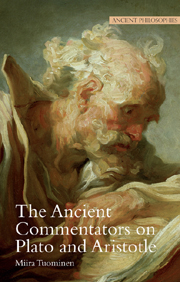6 - Metaphysics
Summary
The very term “metaphysics” comes from the early phases of the commentary tradition. In the edition of Aristotle's works made around 60 bce or slightly before, the work that we know as the Metaphysics receives the Greek name ta meta ta phusika, “those writings that come after physics’. Aristotle himself had talked about “first philosophy” (prōtē philosophia), the study of being as being, in the middle books of the Metaphysics, which he also refers to as “theology”. Whereas physics studies what is common to all natural things as natural things, first philosophy studies what is common to things in so far as they are. This, Aristotle indicates, is the highest and most general point of view from which we can consider things. The formulation “being as being” (to on hē on) immediately raises the question of whether this means being as existence, or being as being something. This question is addressed below in our discussion (e.g. § “What do the forms do?”).
We have the following commentaries on the Metaphysics: (i) Alexander of Aphrodisias on the first five books; (ii) Syrianus on Books III, IV, XIII and XIV (CAG VI 1), (iii) Asclepius, from the lectures of Ammonius, on Books I–VII (CAG VI 2); and (iv) an unidentified commentary on Books VI–XIV, which has come down to us appended to Alexander's commentary on Books I–V. The authorship of the last mentioned work is disputed; many scholars date it as late as the twelfth century and attribute it to Michael of Ephesus (e.g. Menn 1995; cf. Sorabji 2004: vol. 3, 125).
- Type
- Chapter
- Information
- The Ancient Commentators of Plato and Aristotle , pp. 200 - 236Publisher: Acumen PublishingPrint publication year: 2009

